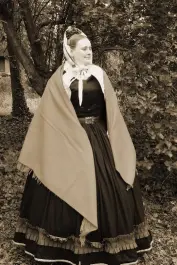From Moore’s Rural New-Yorker in Rochester, NY
May 28th, 1864
Out-Door Etiquette – A gentleman meeting a lady should always take the right of the walk
A gentleman meeting another, should always pass to the right.
A lady, as a general rule, should not take a gentleman’s arm in the street in the day time. However, it is not improper when the walk is thronged with passengers.
A gentleman meeting or passing a gentleman and lady should pass on the gentleman’s side.
A gentleman should never fail to salute a lady of his acquaintance when within a proper distance, unless she wear a veil, in which case it would be highly uncivil to recognize her.
Reply to “The Unprotected Female.”
That any person in this enlightened age – the year of our Lord 1864 – should write such sentiments as those contained in the article on the “Unprotected Female,” passes my understanding. I was shocked more than words can express upon first perusing it! And the subject occurred to my mind again and again; the more I endeavored to banish it, the more it wouldn’t go; and that the author was the victim of a strange hallucination, and optics sadly obscured, as though seeing darkly, through smoked glass, and with mental vision in the same unfortunate predicament, would continually suggest itself.
Nevertheless, to relieve my mind, I will use a woman’s privilege, and express my opinion. It may seem egotistical, but Dr. Winship remarks: – “In every man’s experience – that of the humblest, even – there is something of value to the race;” therefore, I conclude there must be in every woman’s.
I, for one, believe it to be a man’s prerogative and pleasure to protect a woman whenever necessary; she being physically the “weaker vessel,” custom sanctions it – and every refined, intelligent person must approve it. In some cases, however, it is quite uncalled for. Alas, when she loses her shrinking modesty, and so far unsexes herself as to be seen striding in “male attire,” stamping around with a cigar in her mouth, she should not “demand any more interest or sympathy than an unprotected male,” but can insure the hearty contempt and disgust of every right-minded one.
I have yet to be convinced that fashion required us to be encumbered with “many boxes and bundles.” Doubtless many take more baggage than necessary, but in my travels I have observed but comparatively few who have not availed themselves of the express to take charge of their trunk or trunks, troubling themselves only with a small traveling bag, when the distance made it necessary, which could be carried on the arm, leaving “both hands free.” I have seen many travel hundreds of miles with noting save the above mentioned trunk, which being in the hands of the express need be no trouble or care to any one, and which niceness would render indispensable a the journey’s end. I have further known ladies to visit the city of New York and sister cities, and, without ignoring fashion, remain at a hotel a whole week, with by a small basket containing only necassaries for the toilet, and wearing their traveling dress during the time.
It seems wonderfully pertinent (?) comparing the quantity of a gentleman’s baggage with that of a lady’s, with their different style of dress; for did neither take a useless article and indulge equally in the luxury of cleanliness, a lady would absolutely require far more. It is a notorious fact that gentlemen need only changes of linen; and it may be a slander of the sex, but I never supposed a little dirt, more or less, would effectually disturb their equanimity.
Aside from the exaggeration conspicuous in every paragraph, the writer betrays an entire ignorance of “fashon.” Allow me to ask if it is not the fashion to wear stockings and boots, rivaling men’s in warmth and thickness?
And the hoop skirt, that many of the masculine sex raised such a hue and cry about, and with their usual consistency concerning anything pertaining to ladies’ dress, were unwilling wife or daughter to appear without, has been growing “small by degrees, and beautifully less,” until none need now complain of their dimensions, which it is to be hoped will continue the same. Without dwelling on their gracefulness or excellence in making a handsome dress appear to the best possible advantage, they are indispensable in a physiological point of view. Women need their powers of locomotion assisted rather than impeded. In the words of the editor of the Scalpel, “We consider the modern hooped skirt one of the most admirably artistic and health-giving devices of our time.”
And, pray, is it not the day of “Garibaldi’s,” “Zouave,” and other kindred jackets, that leave the waist in perfect freedom? It strikes me as being an exceedingly lame, one-sided argument because it is a deplorable fact that some, through ignorance, carelessness, or folly, injure themselves with tight-lacing, that the corset should be discarded. It is useless to mention that they are necessary to insure a perfectly fitting dress, and essential to that distinction of style which marks the well-bred lady; for I trust the author referred to is above any little weaknesses of any kind’ and I fully believe a French corset scientifically adapted to the figure, to be conducive to health, as many of our best physicians assert; so loose when laced as to readily place the hand under, and with whalebones so this as only to be perceived by the delightful feeling of support they give. Many with weak sides and irresistibly inclined to stoop have been permanently benefitted by them. Suppose wine should be abandoned as a medicine, because so many unfortunately became intoxicated? What if an unbeliever should bring forward as conclusive evidence against the need, the power of Christianity, that in a fit of religious phrenzy some have committed suicide?
Perhaps because tight dresses are sometimes worn, they had better be rejected altogether! Indeed, although the present style (without apparently knowing what that style is) was sweepingly condemned, as nothing better was suggested, I am at a loss to determine whether the writer considered it preferable to return to the primitive state of our first parents, or don masculine habiliments which seemed to find much favor in her eyes. As dress, in a measure influences character, likely the next innovation would be chewing, smoking and swearing; for, without the provocation of “trailing skirts,” far too many of the “sterner sex” in our small villages and cities, as well as in far-famed Gotham, seem to cultivate and esteem the latter as an accomplishment.
It is a painful thought that any woman can have perverted views, such questionable delicacy and modesty, as to advocate such a change. The Bible expressly forbids it: “The woman shall not wear that which pertaineth unto a man.” I well recollect the effect of the first “Bloomer costume” I ever beheld. It was at the “Crystal Palace,” and attracted more attention than any of the miracles of workmanship and art exhibited there. Is such conspicuousness pleasant? – that sort of notoriety desirable by a refined, cultivated, judiciously educated, or even by a modest woman?
Sufficient exercise in the open air, with regular hours and habits, would go far toward restoring the health and strength so greatly heeded. As “seeing is believing,” I can show Miss (or Mrs.) “Amanda Roberts Keyser” a woman past “her sixteenth year,” and dressed for the last three years with considerable “regard toe the dictates of fashion,” who has not been troubled for an instant during that period to “draw a natural breath.”
I would also assure her that for some time past, it has not been the “fashion” to let the skirts trail in the dirt, but to wear them looped up. I certainly admire the queenly gracefulness of the long flowing skirt, which has the prestige of antiquity; was worn and admired by the haughty Grecian and Roman ladies. But I consider other place more appropriate for the trail than the dirty streets of New York.
It seems equally reprehensible to follow every varying phrase of fashion, or excite undue notice by the ridiculous outer appearance that must inevitably follow an entire disregard of the prevailing mode. Among the multiplicity of designs, something genteel and pretty can always be selected, which will occupy no more time in making than would the most singular, uncouth costume that could be imagined. I believe it woman’s duty to make herself pleasing, and dress according to the station in which she may be placed; nor do I believe she could perform other more important duties, by a disregard of this. Nor need a person gratifying a fine aesthetic taste by dressing in a becoming robe, necessarily neglect the preparation of the immortal soul for the life to come, more than if poorly clad in somber hues, – any more than one’s a better Christian for wearing such a gloomy, sour, woe-begone visage as to frighten children, and cause them to think religion something terrible.
There will always be pratting about the inferiority of women by a certain class of men, whose morals are fearfully out of repair, and where brains are decidedly at discount; and probably some women will, too, parrot-like, repeat their opinion. The writer has the advantage of me, however, if she has ever heard anything more silly emanating from the lips of women than men.
In closing, I can not forbear giving, for future consideration, the injunction of Horace, Sumite materiam vestris, qui scribitis, acquam Viribus. Lancillotti.
(translation of the last line – let those who write fix on a subject to which their force is equal)







